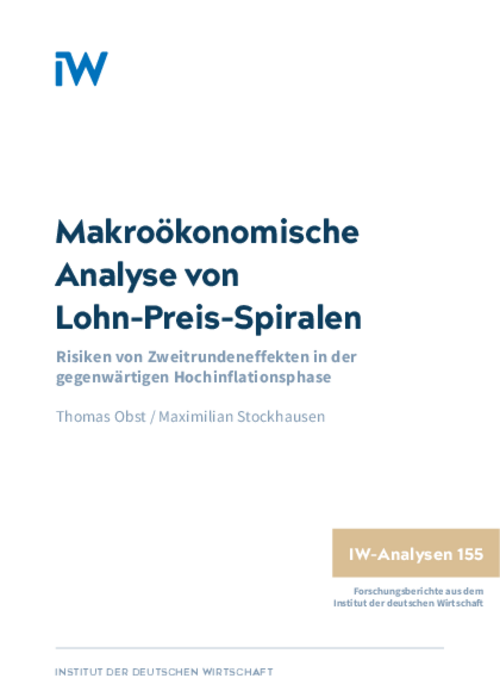The subject of this Analysis is the forms that wage-price spirals can take and how they influence macroeconomic stability and inflationary trends in Germany.

A Macroeconomic Analysis of Wage-Price Spirals

The subject of this Analysis is the forms that wage-price spirals can take and how they influence macroeconomic stability and inflationary trends in Germany.
Inflation in 2023 is being stoked by domestic price drivers and paral¬lels with the 1970s and 1980s highlight the close connection between labour costs and inflation rates. Most cost drivers that are not directly dependent on wages have no inherent tendency to induce cumulative price increases. An analysis of the correlation between inflation and income distribution reveals no evidence of a profit-price spiral across the whole economy and, indeed, in 2022 the functional distribution of income remained virtually unchanged. Moreover, an empirical analysis of the Phillips curve for Germany from 2015 to 2023 shows that inflation expectations, unemployment and external factors are the key factors behind inflationary trends, thus rehabilitating the Phillips curve as a theoretical instrument for explaining price changes and confirming that labour market developments are an important influence on price trends. Finally, it needs to be emphasised that central banks should react to (loom¬ing) wage-price spirals with a restrictive monetary policy in order to prevent inflation reaching system-threatening levels. The authors therefore warn of the dangers of a pro-cyclical wage policy in Germany and stress the need to avoid the second-round effects of inflation.

A Macroeconomic Analysis of Wage-Price Spirals

More on the topic

IW Distribution Report 2023: Attitudes towards social mobility
Fundamentally linked to the social market economy is the idea that everyone has the opportunity for social advancement, regardless of their social background, and that children should be better off than their parents.
IW
Punching up or Punching down?: How Stereotyping the Rich and the Poor Impacts Redistributive Preferences in Germany
Redistribution and the welfare state have been linked by academic discourse to narratives that portray specific societal groups as ‘deserving’ or ‘undeserving’. The present analysis contributes to this scholarship in a twofold manner.
IW